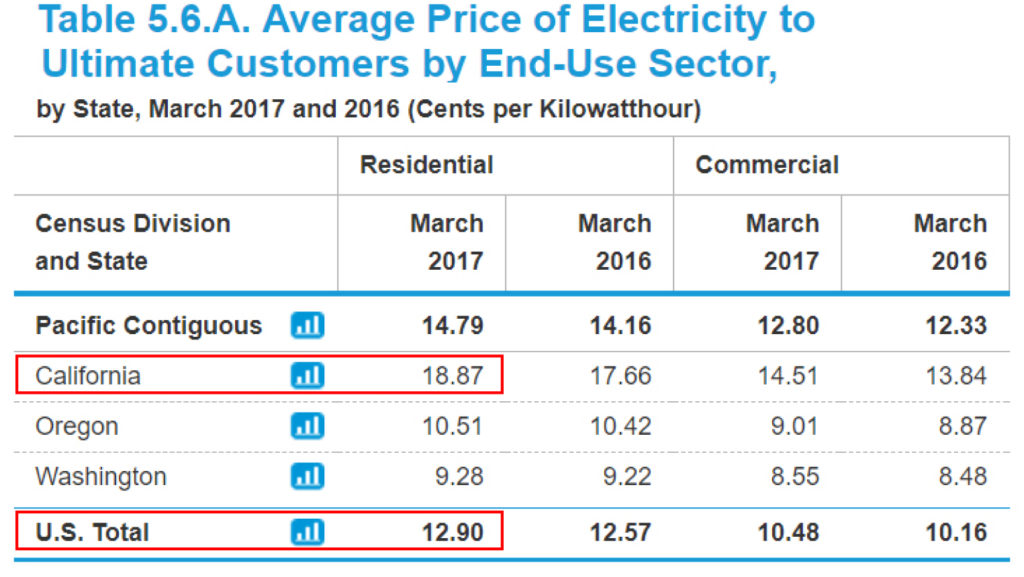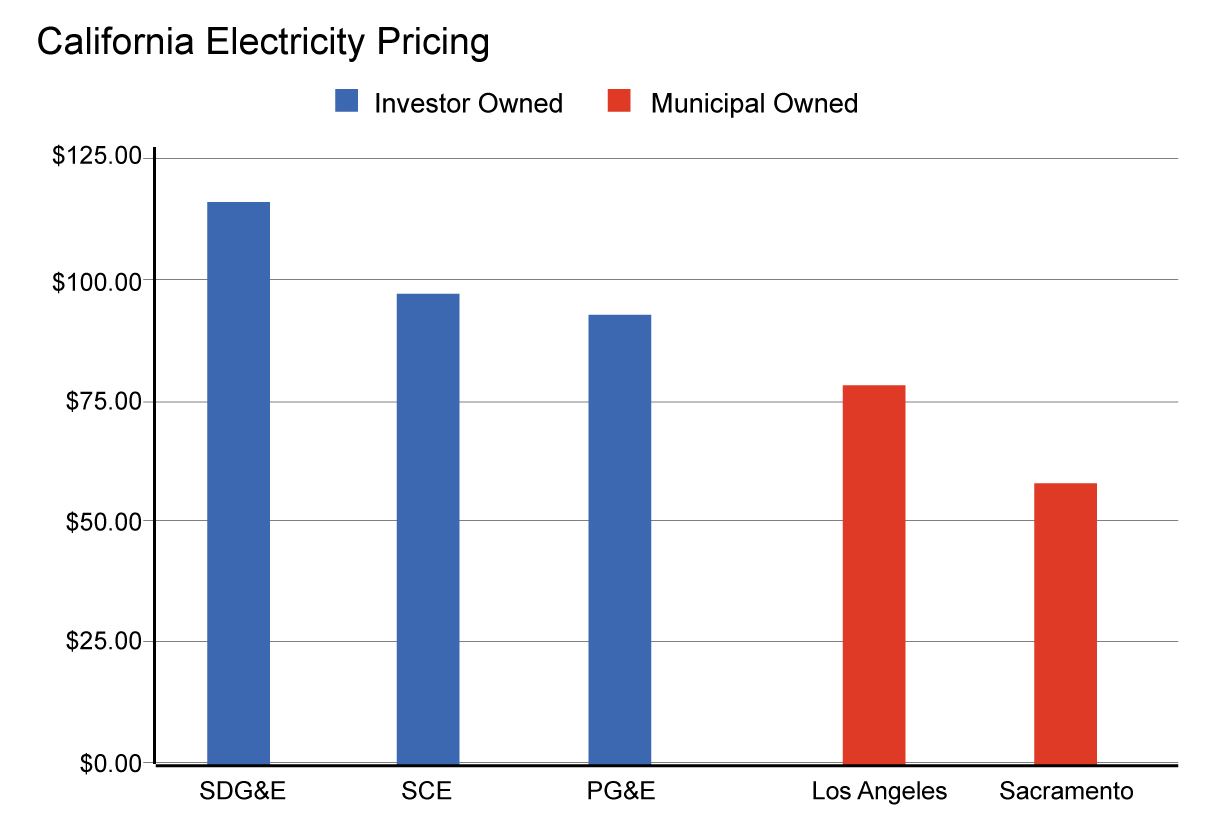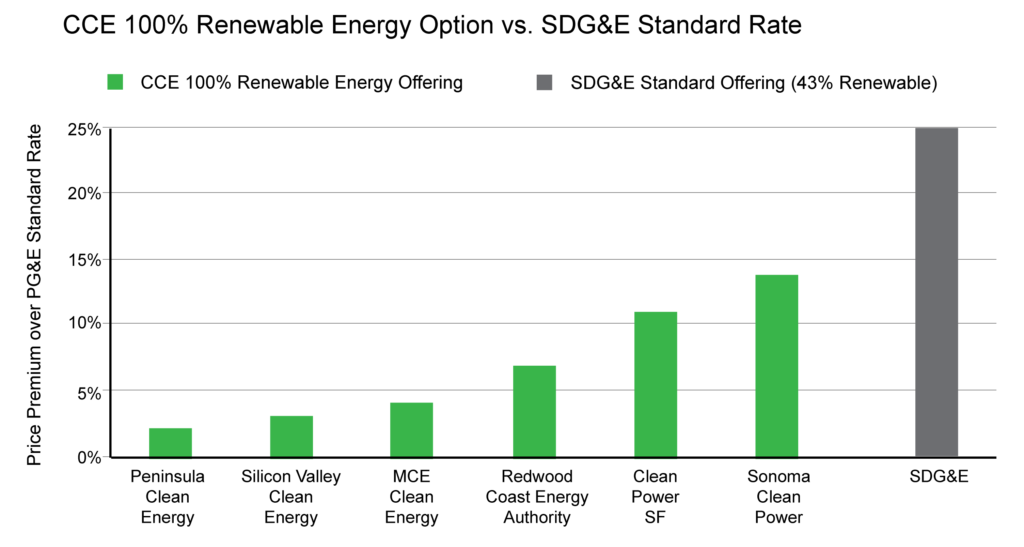Originally published in the San Diego Free Press on June 22, 2017
By Tyson Siegele / SanDiego350

Sempra promotes itself as an upstanding community participant with only the best intentions for its customers, but in conjunction with SDG&E, it charges exorbitant rates and fights tooth and nail behind the scenes to maintain its monopoly. It does so at the expense of electricity consumers. SDG&E and its parent company Sempra have been misleading customers about their stance on Community Choice Energy (CCE).
By reviewing Sempra marketing material and comparing Sempra’s statements to its actions, a clear pattern of misdirection and exploitation emerges.
Sempra Marketing
In January 2017, KBPS reported on the SDG&E illegal lobbying scandal. In the article, KBPS highlighted a flier in which SDG&E’s parent company, Sempra Energy, claimed it endorsed a “cleaner energy future.” The flier describes SDG&E aspirations using broad generalizations and cherry-picked facts.
To set the record straight, here is a review of Sempra’s statements versus Sempra’s actions:
Sempra Goals
“Ultimately, we must begin developing collaborative solutions that support our overall shared goals: reduce emissions, minimize costs and empower choice…”
~ Sempra flier
Sempra claims interest in three laudable goals: empowering choice, reducing emissions, and minimizing costs. Words are cheap. Sempra’s actions reveal different priorities. The following information shows how poorly SDG&E’s track record aligns with Sempra’s rhetoric.
Minimizing Costs
Sempra claims it prioritizes low costs. Its actions suggest two possibilities: either Sempra has failed, or cost minimization is just a talking point. According to the U.S. Energy Information Administration, California electricity costs 46% more than the national average.

However, since electricity pricing across the state is not uniform, that is not the end of the story. In 2014 the Southern California Public Power Authority reviewed electricity prices in California and found widely varying rates. Their survey revealed that SDG&E customers have the highest electricity rates in the state. In fact, SDG&E customers pay twice as much for electricity as customers of Sacramento’s municipal utility.

People unfamiliar with the cost savings delivered by municipal utilities often assume government-run electricity programs would be inefficient. The actual rates achieved by municipal utilities tell a different story. Municipal utilities as well as government-run Community Choice Energy programs deliver better rates throughout California than investor owned utilities do.
Unfortunately for San Diegans, in a state with expensive electricity, SDG&E charges more than any other utility.
Empowering Choice
Empowering choice is likely the exact opposite of what Sempra is trying to do. Sempra didn’t form its lobbying arm because it wanted to, as implied by the flier, or as it states, “to engage in a realistic conversation.”
Sempra formed its lobbying arm specifically to lobby against choice.
Prior to 2011, utilities had used ratepayer money to undermine the formation of Community Choice Energy programs in hopes of maintaining a monopoly over electrical power. In an attempt to force utilities to stop using customers’ money to lobby against consumer choice, California state lawmakers created SB-790. Thus, when Sempra Energy decided to fight Community Choice Energy, it was required by law to create a new lobbying division for that purpose.
As per SB-790:
“The code of conduct, associated rules, and enforcement procedures, shall…(1) Ensure that an electrical corporation does not market against a community choice aggregation program [another name for community choice energy], except through an independent marketing division that is funded exclusively by the electrical corporation’s shareholders and that is functionally and physically separate from the electrical corporation’s ratepayer-funded divisions.”
For further and unequivocal evidence, Sempra plainly states in their November 2015 Advice Letter (PDF page 3, paragraphs 3 and 4) to the California Public Utilities Commission that it plans to lobby against Community Choice Energy.
SDG&E is the only utility in the state to take this extreme action to stifle competition. Sempra’s actions show it has no intention of empowering choice.
Reducing Emissions
To understand how well SDG&E has addressed emissions one needs to have a general understanding of the big picture. The state of California adopted a Renewable Portfolio Standard (RPS) stating that utilities need to provide at least 33 percent renewable energy by the year 2020. As of 2017, SDG&E has already surpassed that number achieving 40 percent renewable energy content in their electricity generation mix.
Without looking further, it would appear that SDG&E should get high marks for reducing emissions. However, nothing happens in a vacuum. Forty percent renewable electricity generation is only impressive if SDG&E’s renewable percentage is above its peers or equal to its peers at a lower cost.
California utilities and Community Choice Energy programs make up SDG&E’s peers. It has already been noted that SDG&E is the highest cost electricity provider in the state, so the only way for SDG&E to redeem itself would be to show customers that it has achieved a significantly higher renewable energy content in exchange for the premium prices it levies upon them.
Perhaps the best way to assess SDG&E’s success or failure would be to compare it to CCE programs throughout the state. Not only are these CCE programs pricing electricity lower than the incumbent utilities making CCEs the most logical comparison, a CCE is exactly the kind of program that SDG&E is determined to block in its own service area.
The graph below lists the six active CCE programs in PG&E territory compared to SDG&E pricing. Zero represents the baseline and is set equal PG&E’s standard rate. The green bars represent various CCE programs’ 100% renewable offerings. The grey bar represents SDG&E’s standard offering.

The graph reveals that every CCE 100 percent renewable offering costs less than SDG&E’s standard rate. Keep in mind, SDG&E’s standard rate includes only 40 percent renewable energy.
Sempra’s flier claims that SDG&E is a leader in renewable energy by comparing it to the standard offerings from other California utilities. It conveniently ignores the fact that Community Choice programs offer 100 percent renewable energy for less than SDG&E’s standard rates. The claims made in Sempra’s flier would be like the San Diego Padres bragging that they are beating their least successful competitors while desperately trying to avoid comparisons with any successful Major League teams.
Sempra Actions
Sempra announces its goals in its flier and its duplicity in its actions. Instead of empowering choice, Sempra formed a lobbying entity to stifle it. Instead of minimizing costs, it charges the highest electricity rates in the state. Instead of reducing emissions, it opts for misdirection by trumpeting favorable comparisons and omitting reasonable ones.
The first paragraph of the flier states, “Our goal is to provide a balanced and fact-based perspective regarding California’s changing energy landscape.” Perhaps Sempra started with facts, but they certainly got lost somewhere along the way.
Call to Action
If you would like affordable electricity, an alternative to SDG&E, and more local clean energy, it is time to let your city council know that you want Community Choice Energy. City councilmembers make the decision whether or not to adopt CCE programs.
The City of San Diego is aiming for an end of the year vote on CCE and it would benefit from your input. If you live in the City of San Diego, I urge you to contact your councilmember and ask them to support CCE. You can find the name of your representative here. Make sure to address and send your email to both Mayor Faulconer and your city councilmember so that each of them know where you stand.
City of San Diego Contact Information:
Mayor:
Kevin Faulconer, Mayor kevinfaulconer@sandiego.gov
Councilmembers:
Myrtle Cole, Council President myrtlecole@sandiego.gov
Mark Kersey, Council President Pro Tem markkersey@sandiego.gov
Barbara Bry, Councilmember barbarabry@sandiego.gov
Lorie Zapf, Councilmember loriezapf@sandiego.gov
Christopher Ward, Councilmember christopherward@sandiego.gov
Chris Cate, Councilmember chriscate@sandiego.gov
Scott Sherman, Councilmember scottsherman@sandiego.gov
David Alvarez, Councilmember davidalvarez@sandiego.gov
Georgette Gomez, Councilmember georgettegomez@sandiego.gov
Tyson Siegele, a SanDiego350 member, is an architect who works to promote sustainable design and clean energy. Recently he created ButItJustMightWork.com, a residential clean energy handbook, to chronicle things to do, as well as things to avoid, on one’s path to zero emissions.
